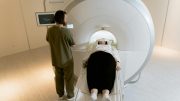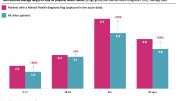Not to alarm you, but if you’ve recently completed an online masters degree in mental health counseling, your chosen profession could be on the line – and sooner than we might think.
Experts on the subject assert that rapid developments in AI technology now threaten even the most traditionally human-led “helping professions” – including, most surprisingly, psychology. With telehealth bots, deep learning, and predictive analytics all leading the way in terms of tech-supported psychiatric care, if nothing else, these AI advances are enough to keep a psychiatrist on their toes.
But despite the threat of mental healthcare jobs being taken over by computers, embracing these advancements can ultimately help us deliver better treatment to mental health patients. So what, specifically, are the new and emerging AI-supported treatment strategies every aspiring mental healthcare professional should be across?
Stay with us as we uncover four ways AI technology is heralding the future of mental healthcare treatment.
1. Digital Diagnostics: More Effectively Diagnosing Mental Illnesses and Cognitive Disorders
AI algorithms. Understanding these can help us better identify anomalies in patient mental health, and also, support mental healthcare professionals in diagnosing cognitive disorders in patients.
Drawing on what is known as machine learning, psychiatrists can effectively utilize AI to analyze existing data about presenting patients – such as their medical and family history, and their past responses to psychiatric treatments – and use these details to inform present-day diagnoses, as well as how best to treat them.
In addition to this, automation of the diagnostic process via the use of AI-supported psychiatric testing can help mental health professionals sift through patient data more easily. Making use of AI software to review the results of computer-led patient testing can transform traditionally manual, labor-intensive data-sorting processes into more streamlined and efficient methods of diagnosis.
2. AI-Assisted Communication: Supporting and Delivering Mental Healthcare Treatment via Telehealth Apps and Software
The high uptake of telehealth phone and video conferencing appointments through the COVID-19 lockdowns and beyond is something almost all of us are familiar with. But what are some other ways AI software and technology can support psychiatric care?
Amazingly, AI-enhanced wearable technologies – such as nanoelectronic sensor devices – can be used to monitor and analyze a patient’s mental state. How? Essentially, wearable nanodevices can measure physiological reactions in the body – such as elevated heart rate, or galvanic skin response (which indicates sweat gland activity) – to determine a patient’s level of stress, anxiety, or other emotional conditions. Unusual activity could suggest that there is a deeper underlying issue – one that could be treated with therapy and psychiatric care.
3. Quality Control: AI Tech Can Monitor and Assess the Delivery of Mental Health Treatment and Care
Are you familiar with natural language processing, or NLP? If you’re a mental healthcare professional, you’d best believe that you should be.
The thought-provoking ways NLP can be used to monitor therapy consultation sessions with patients may shock you – and even cause you concern if you’re not doing your job correctly.
AI-assisted NLP software can take transcripts of any given therapy session and analyze exactly what’s being said – especially with specific identifying keywords plugged into the program.
Despite any initial reluctance to engage with this process, though, the truth is that it can be a massively beneficial tool for psychologists, as it can help them better understand what type of language to incorporate into therapy sessions for the most optimal treatment results.
4. More Accurate Assessment with AI: Reviewing and Modifying Mental Healthcare Treatment Methods as Needed
Natural language processing software programs can also be utilized to modify the type of psychiatric treatment being given to a patient.
Using AI-supported NLP software to analyze therapy transcripts could well uncover that a patient is no longer responding to a particular type of treatment. The patient may be making statements that indicate they’re unwilling to participate in cognitive behavioral therapy or take on specific tasks their treating practitioner is asking them to complete. It might even be identified that the patient requires a different type of treatment altogether, or perhaps, that they require medication. In this case, the treating therapist can refer the patient to a psychiatrist – someone who has the authority to dispense and prescribe pharmaceutical drugs.





